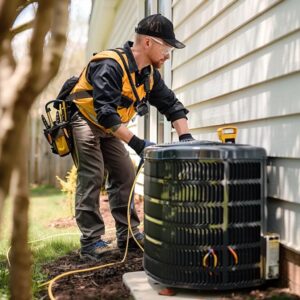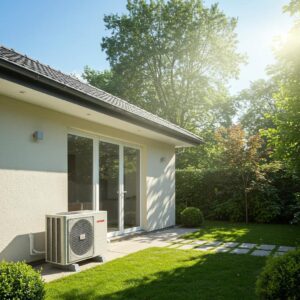Upgrade Your Home's Heating: Slash Costs & Boost Comfort with Energy-Efficient Solutions!
Did you know that heating your home can gobble up nearly half of your monthly energy bills? The good news is, by choosing the right systems, you can enjoy maximum comfort, significantly cut those utility costs, and even reduce your environmental impact. In this guide, we’ll walk you through the top energy-efficient heating systems—from powerful heat pumps to efficient condensing boilers. We’ll cover everything you need to know about selecting the best option, getting it installed right, keeping it running smoothly, and taking advantage of financial incentives. As the owner of Airheat America, proudly serving Brookhaven, GA, and the surrounding areas, I’ll also show you how to get free HVAC installation quotes and reliable repair services, ensuring your new system delivers top-notch performance year after year.
What Are the Top Energy-Efficient Heating Systems for Homes?
A heat pump is a real game-changer, transferring heat from the air or ground with incredible efficiency – up to 300%! This means it generates more warmth for every kilowatt-hour of electricity used compared to traditional furnaces, leading to immediate energy cost reductions and a smaller carbon footprint.
When you’re exploring your options, think about how each system works, the initial investment, and what’s involved in routine maintenance. This will help you find that sweet spot between savings and ultimate comfort.
How Do Heat Pumps Deliver Energy Savings for Your Home?
Heat pumps work by using a refrigerant cycle to capture ambient heat and concentrate it inside your home. They’re so efficient they can deliver about three units of heat for every unit of electricity they consume. This translates directly into heating expenses that can be up to 50% lower than those from electric resistance heaters.
Heat Pump Efficiency and Your Savings
Heat pumps offer substantial energy savings when compared to older electric resistance heaters. They’re capable of delivering roughly three units of heat for every unit of electricity used, which means lower heating bills and a reduction in greenhouse gas emissions.
U.S. Department of Energy
This information from the U.S. Department of Energy backs up our points about how efficient and cost-effective heat pumps truly are.
| Heating System | Efficiency Metric | Estimated Annual Savings (USD) |
|---|---|---|
| Air-Source Heat Pump | HSPF 8–10 | $500–$800 |
| Ground-Source Heat Pump | COP 3.5–4.5 | $900–$1,200 |
| Electric Furnace | 100% | $0 |
Heat pumps truly shine in milder climates. Plus, with the latest cold-climate models available, they continue to perform efficiently even when temperatures drop below freezing, making them a fantastic, versatile choice for homes in the Brookhaven area.
What Are the Advantages of High-Efficiency Furnaces for Homeowners?
A high-efficiency furnace is designed to convert over 90% (typically between 90% and 98%) of its fuel directly into heat. This is achieved through advanced combustion processes and sophisticated heat-exchange designs. The result? Less fuel is consumed, carbon emissions are lowered, and your home stays consistently warm, even during the coldest months.
High-Efficiency Furnace Technology Explained
High-efficiency furnaces are engineered to convert a significant portion of their fuel into usable heat, thanks to cutting-edge combustion and heat-exchange technology. This leads to reduced fuel consumption and lower carbon emissions, ensuring your home remains comfortably warm throughout the winter.
Energy Star, Furnace Guide
This endorsement from Energy Star and their Furnace Guide confirms our explanation of how high-efficiency furnaces operate and the benefits they offer.
How Do Boilers and Hydronic Heating Systems Boost Home Energy Efficiency?
Condensing boilers are designed to capture the latent heat from exhaust gases using a secondary heat exchanger, achieving impressive thermal efficiencies of 90–98%. Meanwhile, hydronic radiant-floor systems distribute heat evenly by circulating warm water at lower temperatures, enhancing overall comfort while using less energy.
What Advanced Heating Technologies Can Improve Home Comfort and Efficiency?
Smart thermostats are brilliant at learning your household’s schedule and automatically adjusting heating setpoints. When combined with zoning dampers that direct heated air only to the rooms you’re using, these technologies can collectively trim energy waste by up to 20% and provide customized comfort precisely when and where you need it.
How Do You Select the Best Energy-Efficient Heating Solution for Your Home?
Choosing the ideal heating system means matching your home’s specific size, layout, and local climate with the system’s performance metrics—like AFUE, HSPF, and SEER. It’s also about finding the right balance between the initial installation costs and the projected long-term savings.
What Key Factors Should Guide Your Heating System Choice?
When making your decision, consider important factors such as the typical winter temperatures in your area, the total square footage of your home, the existing layout of your ductwork or piping, the quality of your home’s insulation, your desired system lifespan, and your budget for both the equipment and its installation.
How Do Energy Efficiency Ratings Like AFUE, HSPF, and SEER Influence Your Decision?
These ratings are standardized performance benchmarks that help you compare different systems. They provide a clear indication of how much energy your system will use, allowing you to estimate payback periods and understand the lifetime operating costs.
Understanding Energy Efficiency Ratings and Their Impact
Energy efficiency ratings, such as AFUE, HSPF, and SEER, are crucial tools for comparing the performance of various heating and cooling systems. These ratings empower homeowners to estimate their energy usage and potential savings, guiding them toward making the most informed decisions.
Air Conditioning, Heating, and Refrigeration Institute (AHRI)
This clarification from the Air Conditioning, Heating, and Refrigeration Institute (AHRI) highlights just how important energy efficiency ratings are when you’re selecting a heating system.
| Rating Type | Description | Impact on Energy Use |
|---|---|---|
| AFUE | Annual fuel-to-heat conversion efficiency (%) | Higher AFUE means lower gas bills |
| HSPF | Heating Seasonal Performance Factor (heat pump) | Higher HSPF lowers electricity use |
| SEER | Seasonal Energy Efficiency Ratio (cooling) | Higher SEER indicates reduced cooling load |
Which Heating Systems Are Best Suited for Different Home Types and Climates?
The way your home is built and the climate you live in will ultimately determine which heating technology will perform most efficiently and offer the best return on your investment.
| Home Type | Climate Zone | Recommended System |
|---|---|---|
| Well-insulated | Mild winters | Air-Source Heat Pump |
| Large, older home | Cold, sub-freezing | High-Efficiency Furnace + Zoning |
| Open-plan format | Moderate climates | Hydronic Radiant-Floor Boiler |
How Does the Installation Process Affect Energy Efficiency and Cost Savings?
Getting your system installed correctly is key to ensuring it operates exactly as engineered. Proper installation prevents efficiency losses that can occur from leaks, incorrect sizing, or poor airflow, which can otherwise undermine the benefits of even the most high-efficiency equipment.
What Are the Essential Steps for Installing an Energy-Efficient Heating System at Home?
- Start with a detailed load calculation to ensure your equipment is sized perfectly.
- Choose the system type and efficiency ratings based on the results of your home assessment.
- Secure any necessary permits and confirm that your ductwork or piping is ready for installation.
- Install the equipment with meticulous precision, ensuring all joints are sealed and controls are calibrated correctly.
- Conduct thorough commissioning tests, measure airflow, and perform all required safety inspections.
Why Is Professional HVAC Installation Crucial for Optimal Performance?
Certified technicians use specialized tools and strictly follow manufacturer specifications. This ensures the correct refrigerant charge, precise combustion settings, and balanced airflow—all critical elements that maintain a system’s rated efficiency and ensure its long-term durability.
How Can You Obtain a Free Installation Quote for Energy-Efficient Heating Solutions?
To explore your upgrade possibilities and receive a no-obligation estimate, simply reach out to Airheat America. We provide free HVAC installation quotes specifically tailored for your Brookhaven, GA home. Our expertise guarantees accurate pricing and a smooth project planning process.
What Maintenance Practices Keep Your Heating System Running Efficiently?
Regular upkeep is essential for maintaining your system’s efficiency. It helps prevent restricted airflow, protects heat-exchanger integrity, and ensures controls remain properly aligned, all of which can drive up energy consumption if neglected.
How Often Should You Service Your Heating System to Maintain Peak Efficiency?
We recommend annual professional inspections for furnaces and boilers, along with yearly tune-ups for heat pumps. Don’t forget to replace your air filters every 1–3 months. This consistent care ensures continuous high performance and helps catch potential issues early on.
What Simple Maintenance Tips Can Help Reduce Energy Waste?
- Swap out or clean your air filters to keep airflow optimized.
- Check and seal your ductwork to prevent any heat loss.
- Program your existing thermostat or consider upgrading to smart controls.
- Keep vents and radiators clear to ensure unobstructed heat distribution.
When Should You Consider Repair or Replacement for Your Heating System?
If you notice a significant drop in efficiency, experience frequent breakdowns, or if your equipment is over 15 years old, it might be time to consider replacement. Often, the cost of ongoing repairs can outweigh the long-term savings of a new, efficient system, making replacement the more cost-effective choice for sustained comfort and lower bills.
What Financial Incentives and Energy Audits Can Help Lower Your Heating Costs?
By combining professional energy audits with available local and federal rebates, you can significantly offset the costs of upgrading your system. An audit will also pinpoint specific improvements that will yield the greatest energy savings for your home.
How Do Energy Audits Pinpoint Opportunities for Heating Efficiency Improvements?
An energy audit employs tools like blower-door tests, infrared imaging, and duct-leakage measurements to identify insulation gaps, duct losses, and equipment inefficiencies. This process creates a prioritized action plan designed to boost your home’s comfort and reduce overall energy consumption.
What Local and Federal Rebates or Tax Credits Are Available for Home Heating Upgrades?
Homeowners like you may be eligible for these valuable incentives:
- Georgia Energy Efficient Home Credit for installing high-efficiency furnaces.
- Federal Residential Energy Efficient Property Credit, which covers qualifying heat pumps and boilers.
- Rebates offered by your local utility company for purchasing ENERGY STAR® certified equipment.
These programs can dramatically reduce your out-of-pocket expenses, potentially saving you hundreds or even thousands of dollars.
How Can Smart Thermostats and Controls Lower Your Heating Bills?
Smart thermostats are designed to learn your household’s occupancy patterns and automatically adjust temperature settings to save energy. Features like remote access and geofencing capabilities further minimize wasted heating runtime, often leading to 10–15% annual energy savings without compromising your comfort.
How Do Energy-Efficient Heating Solutions Contribute to Environmental Sustainability?
By utilizing advanced heat-exchange technologies and environmentally friendly refrigerants, efficient heating systems significantly reduce your home’s carbon footprint, decrease reliance on fossil fuels, and actively support broader climate protection goals.
What Role Does Energy-Efficient Heating Play in Reducing Your Home’s Carbon Footprint?
Boosting your system’s efficiency means using less fuel and generating fewer associated CO₂ emissions with each heating cycle. This directly lowers your home’s environmental impact and contributes to improved local air quality.
How Do Different Heating Technologies Compare in Terms of Emissions and Energy Use?
A look at the annual emissions and energy consumption for various systems clearly highlights their environmental advantages.
| Heating Technology | Annual CO₂ Emissions (lbs) | Annual Energy Consumption (kWh) |
|---|---|---|
| Geothermal Heat Pump | 1,200 | 4,500 |
| Air-Source Heat Pump | 2,800 | 7,200 |
| High-Efficiency Furnace | 4,500 | N/A (gas usage) |
| Condensing Boiler + Radiant | 3,200 | N/A (gas usage) |
Why Is Choosing ENERGY STAR Certified Heating Equipment Important?
When heating equipment carries the ENERGY STAR certification, it guarantees that the product meets rigorous efficiency and performance standards. This means you can expect verified savings, enhanced indoor comfort, and tangible environmental benefits throughout the equipment’s operational life.
What Are Common Questions About Energy-Efficient Home Heating?
What Is the Most Energy-Efficient Heating System for Residential Use?
Geothermal heat pumps consistently lead the pack in efficiency. They harness the stable temperatures found underground, achieving coefficients of performance (COP) as high as 5.0, which translates to consistently low operating costs year-round.
How Can Homeowners Reduce Heating Costs Without Sacrificing Comfort?
Effective strategies include adding insulation, sealing up air leaks, installing programmable or smart thermostats, implementing zoning solutions for targeted heating, and scheduling annual professional tune-ups to keep your system running at its best.
Are Heat Pumps Suitable for All Home Climates?
Absolutely! Modern cold-climate heat pumps are designed to maintain over 75–80% of their heating capacity even when temperatures drop to around –13 °F. For extremely cold conditions, they can be seamlessly paired with supplemental electric or gas heating systems.
How Often Should Home Heating Systems Be Serviced for Optimal Efficiency?
We recommend scheduling professional inspections once a year, along with checking and replacing your air filters every 1–3 months. This consistent maintenance ensures your system operates at its designed efficiency and helps extend its lifespan.
Can Upgrading to Energy-Efficient Heating Increase Home Value?
Yes, upgrades to high-efficiency HVAC systems often add 5–10% to a property’s appraised value. They also significantly enhance market appeal by signaling lower future utility costs and a higher level of indoor comfort to potential buyers.
Investing in efficient heating directly translates to lower energy bills, a more comfortable living environment, and a healthier home for your family. By understanding your system options, efficiency ratings, proper installation techniques, and essential maintenance practices—and by taking advantage of available incentives—you’re setting yourself up for lasting savings and peak performance. As the owner of Airheat America, serving Brookhaven, GA, I encourage you to request your free HVAC installation quote or schedule a repair today to experience the full benefits of energy-efficient heating solutions.



